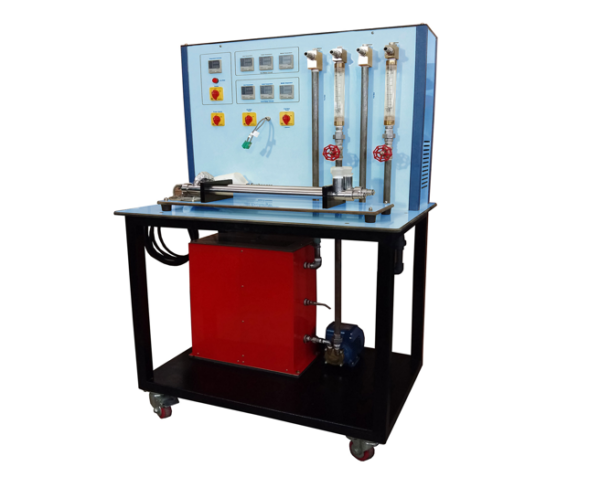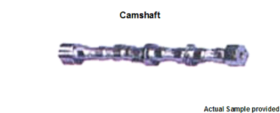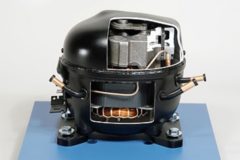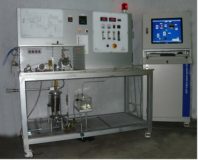Heat Exchanger Supply Unit & Modules Model TH 103
Home » Products » Heat Exchanger Supply Unit & Modules Model TH 103
Heat Exchanger Supply Unit & Modules Model TH 103
- Compact, mobile unit, designed to provide required services for testing various Heat Exchangers using single source.
- Entire process is computer controlled, including change of direction of flow for parallel & counter-flow analysis.
- Comprehensive Instrumentation Panel with all necessary safety instruments.
Heat exchangers transfer thermal energy from the flow of one medium to another. The two flows do not come into direct contact with one another. Efficient heat transfer is a prerequisite for economical processes. Therefore, different heat exchanger types are used in practice depending on the requirements.
Item Description
Sci-tech Computer Controlled Heat Exchanger Service Module TH 103 can be used to investigate and compare different heat exchanger designs. The complete experimental setup consists of two main elements: TH 103 as supply and control unit and choice of heat exchanger: Tubular heat exchanger (TH103-01), plate heat exchanger (TH 103-02), shell and tube heat exchanger (TH 103-03) and stirred tank with jacketed vessel and coil (TH 103-04), and Linear Heat Transfer Unit Model TH 103-05. Water is used as the medium.
The heat exchanger to be investigated is connected to the supply unit. The hot water flows through the heat exchanger. Part of the thermal energy of the hot water is transferred to the cold water. Reversing the water connections changes the direction of flow and thus allows parallel flow or counter-flow operation.
The main function of the TH 103 is to provide the required cold and hot water circuits. To do this, the supply unit is equipped with a heated tank and pump for the hot water circuit, connections for the cold water circuit and a switch cabinet with displays and controls. A temperature controller controls the hot water temperature. The flow rate in the hot water and cold water circuit is adjusted using valves. The cold water circuit can be fed from the laboratory mains or from Water Chiller.
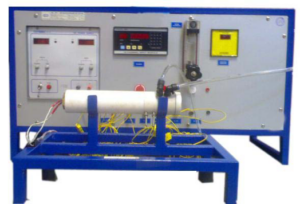
Optionally, Sci-tech offers software for data acquisition and an educational software. With explanatory texts and illustrations, the educational software significantly aids the understanding of the theoretical principles. With the aid of an authoring system, the teacher can create further exercises.
Sensors record the temperatures and flow rates. The measured values are read from digital displays and can be transmitted simultaneously via USB directly to a PC where they can be analyzed using the software.
Specifications
- Supply unit for heat exchangers
- Hot water circuit with tank, heater, temperature controller, pump and protection against lack of water
- Cold water circuit from laboratory mains or water chiller
- Temperature controller controls the temperature of hot water
- Flow adjustable using valves
- Digital displays for 6 temperature and 2 flow rate sensors
- Water connections with quick-release couplings
- Stirring machine connection with speed adjustment (WL 110.04)
- Optional Sci-tech software: educational software and data acquisition
- Software for data acquisition via USB under Windows 7, 8.1, 10
OPTIONAL HEAT EXCHANGER MODULES
Tubular Heat Exchanger Module Model TH103-01
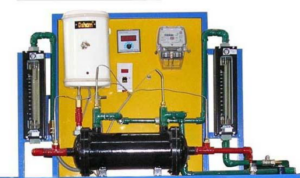
Specifications
- Tubular heat exchanger for connection to TH 103
- Hot and cold water supply from TH 103
- Parallel flow and counter-flow operation possible
- Recording of temperature using TH 103 and two additional temperature sensors for measuring the central temperature
Technical Specifications
Heat transfer surfaces
- mean transfer surface: 250cm2
Inner tube, stainless steel
- outer diameter: 12mm
- wall thickness: 1mm
Outer tube, transparent (PMMA)
- outer diameter: 20mm
- wall thickness: 2mm
Measuring ranges
- temperature: 2x 0…100°C
Plate Heat Exchanger Module Model TH 103-02
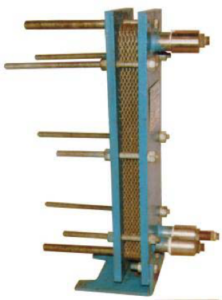
Specifications
- Plate heat exchanger for connection to TH 103
- Hot and cold water supply from TH 103
- Parallel flow and counter-flow operation possible
- Six soldered plates
- recording of temperature using TH 103
Technical Specifications
- 6 plates, stainless steel
- Heat transfer surface: 480cm2
Shell and Tube Heat Exchanger Module Model TH 103-03
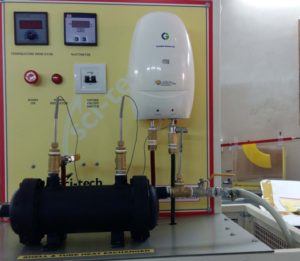
Specifications
- Shell and tube heat exchanger (cross-flow) for connection to TH 103
- Hot and cold water supply from TH 103
- Cross parallel flow and cross counter-flow operation possible
- Transparent shell, visible tube bundle
- Tube bundle consisting of 7 tubes and 4 baffle plates
- Recording of temperature using TH 103
Technical Specifications
Heat transfer surface: 200cm2
Tube bundle, stainless steel
- outer diameter: 6mm
- wall thickness: 1mm
- tubes, 7
Shell, transparent (PMMA)
- outer diameter: 50mm
- wall thickness: 3mm
Stirred Tank with Jacketed Vessel and Coil Module Model TH 103-04
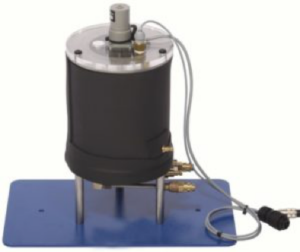
Specifications
- Stirred tank for connection to TH 103
- Hot and cold water supply from TH 103
- Heating using jacket or coiled tube
- Stirring machine can be used in all modes
- Speed of stirring machine adjustable using TH 103
- Visible working area due to transparent cover
- Recording of temperature using TH 103 and additional temperature sensor for measuring temperature in tank
Technical Specifications
Stirred tank
- nominal capacity: approx. 1200mL
Stirring machine
- speed: 0…330min-1
Heat transfer surface
- jacket (stainless steel): approx. 500cm2
- coil (stainless steel): approx. 500cm2
Measuring ranges
- temperature: 0…100°C
Experiments
- Demonstration of indirect heating/ cooling by transfer of heat from one fluid stream to another when separated by a solid wall.
- Energy balance determination (heat balance) and calculation of efficiencies by measuring the flow rates and temperature changes in the hot and cold fluid streams.
- Introduction to different styles of heat exchanger and comparison of the differences in operation and performance.
- Using the Logarithmic Mean Temperature Difference (LMTD) in heat transfer calculations.
- Definition and measurement of Overall Heat Transfer Coefficient (U).
- Demonstration of the differences between counter-current and co-current operation.
- Demonstration of the transition from linear to turbulent flow.
- Effect of hot and cold fluid flow rate on the heat transfer coefficient.
- Effect of driving force (temperature differential) on the heat transfer coefficient.
- Investigation of heat loss and reduction in heat transfer coefficient due to fouling of the heat transfer surfaces (suitable student project using user induced. fouling).

Scitech Linear Conduction Heat Transfer Model TH 103-05
has been designed for students to study the phenomena of Linear Heat Conduction. The setup consists of a Heating Section, Cooling Section & Specimens of different metals. The specimens can be fitted in between Heating & Cooling section. Test specimens of same metal or different metals can be clamped in between the heating & cooling sections.
Temperature sensors record the surface temperature along length of the specimen. Instruments are provided to measure the Temperatures, Power Input to heater & Cooling Water Flow rate.
Detailed Operation & Maintenance Manual is provided along with the trainer.
Specifications
- Power Supply with power regulator
- Heating Section: MOC Brass, 25 mm Dia, fitted with Cartridge type Heater Capacity – 100 W.
- Cooling section: MOC Brass, 25 mm Dia, with cooling water jacket.
- Test Specimen:
- Brass section of 25 mm diameter and fitted with two thermocouples at the same intervals.
- Stainless steel section of 25 mm diameter.
- Aluminium section of 25 mm diameter
- Brass section reduced in diameter to 13mm
- Steel Frame
- Thermocouple sensors
- Temperature Indicator
- Variable Area water flow meter
- Digital Voltmeter
- Digital Ammeter
Experiment Capabilities
- Understanding the Fourier rate equation in determining the rate of heat flow through solid materials
- Measuring the temperature distribution for steady state conduction of energy through a uniform plane solid and a composite plane solid
- Determine the constant of proportionality ( thermal conductivity) of different materials (conductors and insulators)
- Measuring the temperature drop at the contact face between adjacent layers in a composite plane solid
- Measuring the temperature distribution for steady state conduction of energy through a plane solid of reduced cross sectional area
- Understanding the application of poor conductors (insulators)
- Observing unsteady state conduction (qualitative only)
Services Required
- Electric Supply 230 V AC, 16 A, Single Phase, Earthed.
- Cold Water Supply & Drainage.
- Personal Computer with USB port, Windows operating system & all peripherals.

